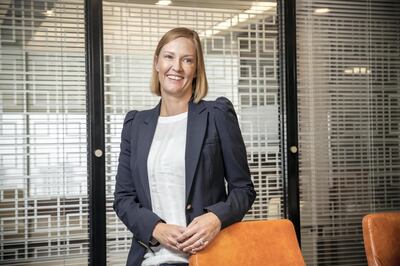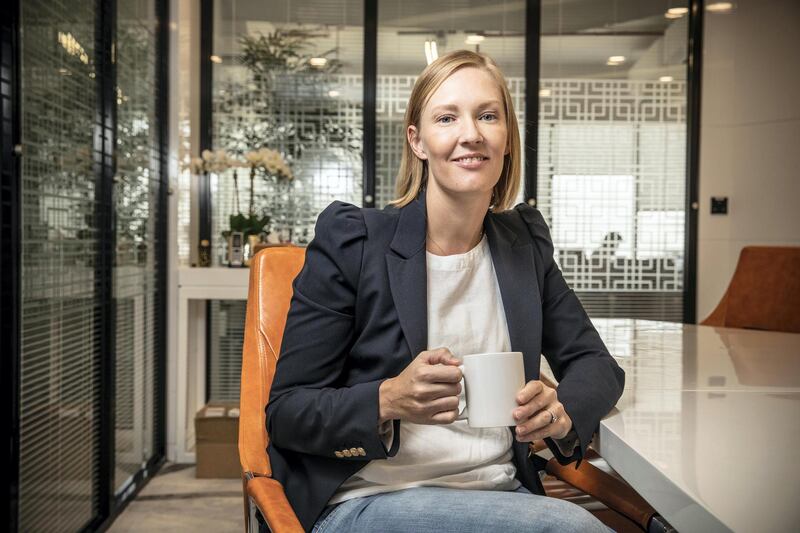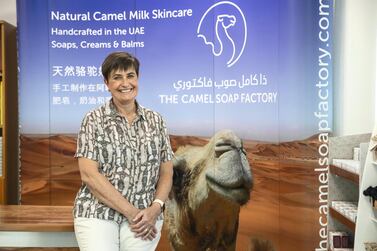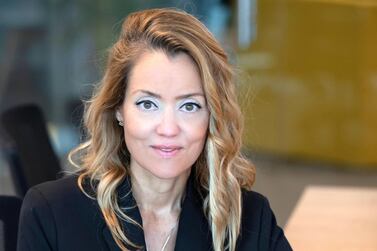Wales-born Laura Manning founded BRW Society, a loose-leaf tea brand, out of her love for the beverage last October. She became a UAE resident in August 2018 after a successful career in the steel industry and now sells 40 unique tea blends, using ethically sourced ingredients and recyclable packaging. Ms Manning, 39, lives in Arabian Ranches with husband Giles, a strategic procurement manager, and their children, a son and two daughters aged from two to six years.
How did your upbringing shape your attitude towards money?
I was raised in a single parent family – just me and my mum – for a long time. She instilled a passionate work ethic, worked really hard, lots of jobs – in a corner shop, cleaning, once making Christmas crackers – to put a roof over our head and food on the table. She taught me the value of money. Pocket money was given if she could afford it. I have strong family values and I’ve always been surrounded by strong women. That made me realise that I’m capable of doing whatever I set my mind to if I work hard.
Did you begin earning while you were young?
My aunties used to let me do their ironing and give me £5 (Dh24) for doing a bag of it. When I was around 10 years old, I convinced mum it would be great if she signed up to Avon (door-to-door cosmetics sales). I had my regular customers and would reinvest to buy samples. Aged 11, I started working in the local shop and got paid about £1.50 an hour.
I’ve always worked, through sixth form and my degree. I liked having money and making decisions on what I could do with it. I became a business graduate in 2013. In my first salaried job, I brought home £23,000 a year in the commercial team with Corus, now Tata Steel Europe.
What made you launch a business in the UAE?
My husband got headhunted and, having had three children, I wanted to do something different. I’d written business plans and always thought I would have my own company one day. It’s hard to make that leap when you’re used to having a salary every month, but we moved here and then I looked at what I could do.
Why tea?
I wasn’t set on opening a tea brand, but I went to the supermarket and couldn’t find stuff I’d normally buy. So, I started exploring, reaching out to different blenders and tea houses around the world, learning about processes. I went to Germany to take part in tea tasting and understand more about blending. Now, I work with different tea houses who do blending for us. We use a company in a free zone to bring our product in, re-package and we distribute to others who sell for us. Our biggest partner is Namshi, which sells in this market and Saudi Arabia.
What is your attitude on spending and saving?
Because we didn’t have a lot growing up, I’m sensible in my approach as an adult. Do I go and buy nice clothes? Yes. Do I do it all the time? No. I take a balanced approach. I like to save and feel secure, so that if something crops up, we can cope. I’m cautious in all decisions and think them through properly. I’d like to think I’m wise.
Do you manage your family’s budget?
I love an Excel spreadsheet. We put a budget together for the year, review it every month and I stick to it. It’s a necessity. When we were living in London, there were two salaries. Here, I’m trying to grow something I’m passionate about and want the kids to be happy and everything covered for them.
How do you save?
We save in our personal pensions and a savings account in the UK. I don’t like to invest in shares, but we invest in property. I bought my first property when I was 23 and flipped it in six months. We have a place in London we lived in before we moved here – an investment for our retirement – and a flat in Cardiff, an investment property.
My best investment is probably starting BRW Society; investing in myself. I’ve loved every minute, being in charge of my time, running the show, taking this brand to the market. I had to dig deep into savings to get this up and running.
Do you have spending weaknesses?
Shoes. I cherish them. When I started working, with my first salary – and I don’t usually splurge on myself – I went to London and bought a pair of Jimmy Choos. The next month, I ended up going to New York with friends and buying a pair of Manolo Blahniks. I show the kids and say “one day these will be yours”.
How do you view money?
It’s an enabler. Money makes you happy to a point because you can pay bills, give your kids what they ask for, a comfortable home, do things you want to do, but I don’t think money is everything. I want BRW Society to be the best it can possibly be, but is money a sole driver to make me happy? No, being with family is the most important thing.

Has the pandemic impacted your home life?
The big thing it made us realise is how much we spend sometimes, particularly on weekends, constantly taking the kids to do something. It all costs. So, the entertainment side of our budget has come down; we don’t have to fill our weekends completely, it’s okay to spend a day at home and relax.
And the business?
We had a clear strategy getting into the marketplace and were very focused on online platforms and the Horeca (hotel, restaurant and cafe) industry. Then March came and everything shut down, so we had to focus on online platforms, advertising and driving more traffic to them, whereas before we relied on more organic growth. We decided to pivot slightly and saw growth. We’ve smashed some of our goals for the first year.
Is BRW Society a luxury brand?
We try to make it as cost-effective as possible – because it’s loose leaf, not repackaged into tea bags, we’re able to do that. But I guess there’s a bit of a premium to it. With our product, a big thing is education, including the environmental impact of teabags. Our teas are that little bit different. We have a traditions range, but everything else is quirky. We target the younger more experimental consumer, but we’re quite inclusive.
What has been your key financial milestone?
Receiving my first salary from BRW Society. For so long, I was just ploughing money into the company. To reach the stage where I could pay myself something … it didn’t matter it wasn’t much. To me, it was a proud moment.
Do you plan for the future?
I’m really clear where I want to take this brand and have huge ambitions. We want to be in more regions in the Gulf. The UK market is of interest and America is a huge tea market. I want BRW to be global one day. If I can make it successful enough until I retire … that’s awesome.








